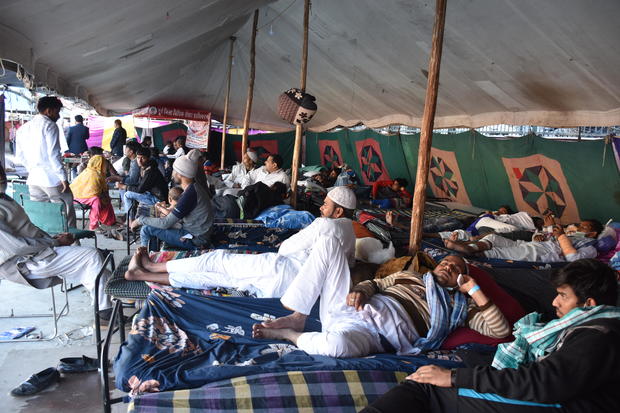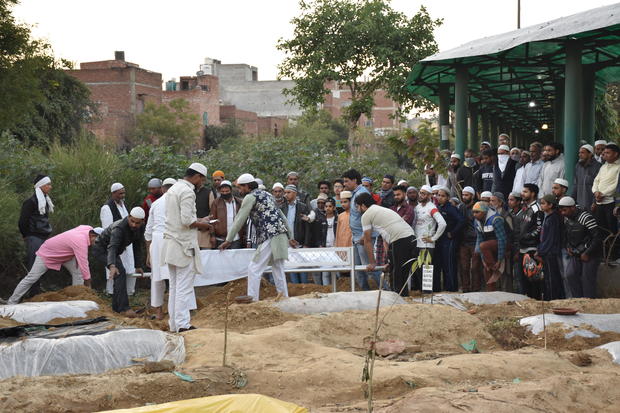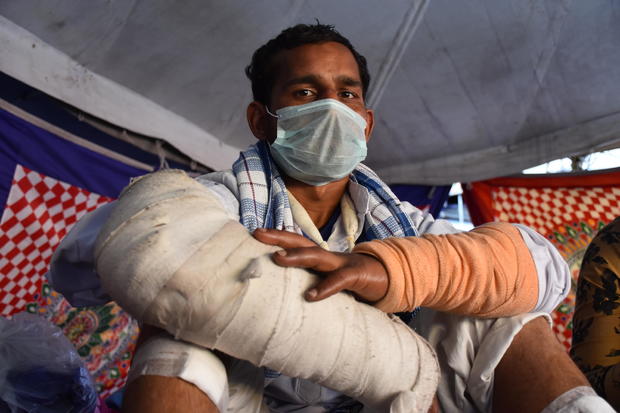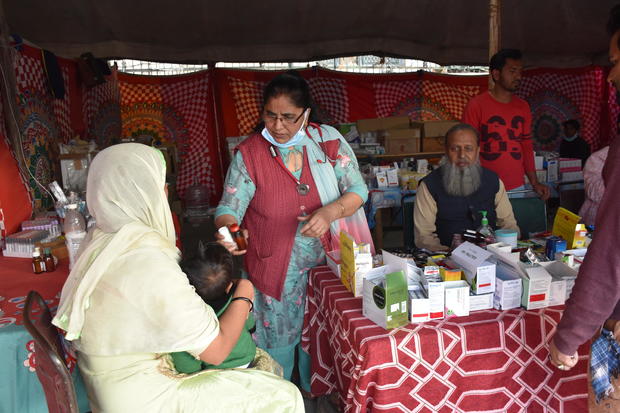The clashes erupted after at least one Hindu politician warned India's police in a public address that if they didn't break up the protests against the new law, he and others would do it for them. Mobs of people armed with iron rods, sticks, Molotov cocktails and homemade guns ransacked several neighborhoods, killing people, setting houses, shops and cars on fire.
Two weeks later, more than 5,000 Muslims find themselves living in at least three makeshift camps. The clusters of tents are overcrowded and lacking some basic amenities for sanitation and hygiene — a dangerous situation amid a global coronavirus outbreak. COVID-19 cases have been reported in the city of almost 19 million.

Muslims displaced from their homes in Delhi, India, rest at a makeshift camp set up in the capital city's predominantly Muslim Mustafabad neighborhood, March 9, 2020.CBS/Arshad R. Zargar
More than 1,500 people, mostly from the Shiv Vihar area in Delhi, which saw some of the worst violence, are now living in the Mustafabad camp alone.
"The future looks so bleak"
"I can never go back to that house again," Khadija Khatoon, 30, who escaped the violence in Shiv Vihar, told CBS News. Her 18-month-old daughter Sajida was lying next to her, with a bandage on her back, as she spoke.
"When I saw mobs setting houses on fire, we locked our front door and went to our rooftop to save ourselves. There, a spark of fire hit my daughter on the back… she cried in immense pain but I couldn't do anything at that moment," Khatoon recalled. "I remember the scene vividly, it still haunts me."
Her family managed to jump onto the roof of an adjacent house to escape the rioters.

Residents at a camp for internally displaced Muslims in India's capital bury Aas Mohammad, 26, whose body lay unidentified for a week after it was discovered in a drainage ditch following violent religious clashes in the city, on March 9, 2020. Arshad R. Zargar
Many people have been reported missing. Police have recovered at least 11 decomposed bodies from drains over the last two weeks, and there's fear that more may have met the same fate. Silence fell over the Mustafabad camp Monday as the body of Aas Mohammad, 26, was lowered into the newest hole in a graveyard dotted with at least a dozen fresh graves.
"I am worried for my children," said Khatoon caressing her daughter. "I don't want them to face what we have faced. Home seems to be a distant dream now… the future looks so bleak."
The government has started giving compensation to the families of those killed and injured. But rehabilitation is a long process. Many families aren't ready to go back and rebuild their homes in neighborhoods with mixed Hindu and Muslim populations, like Shiv Vihar. They say they'd rather move permanently to Muslim-majority areas like Mustafabad.

Mohammed Dilshad sits on a bed in a makeshift camp for internally displaced residents in Delhi, India, March 9, with both arms in casts about a week after he was attacked during sectarian clashes in the Indian capital. CBS/Arshad R. Zargar
"What's the point of going back and remaining in constant fear of getting attacked again?" asked Mohammed Dilshad as he lay on a bed in the Mustafabad camp with both his arms in casts. He was attacked by a mob on February 25 along with four friends on the outskirts of Shiv Vihar.
"I may have been lucky this time, but that may not be the case next time," he said.
He said his friend Naseem Ahmad's cousin wasn't so lucky. He was found dead inside his burned home on the third day of violence, Ahmad said.
A team of doctors at the Mustafabad camp have seen early signs of depression and Post Traumatic Stress Disorder (PTSD) developing in the survivors.
"Many people have reported insomnia and nightmares and come to us for anti-depressants, but we can't prescribe those drugs," Dr. Rukhsana Choudhary, a physician at the relief camp, told CBS News. A team of mental health counsellors is expected to join the physicians soon.

Dr. Rukhsana Choudhary consults residents at a makeshift camp for Delhi residents displaced by religious violence, in the Indian capital's Mustafabad neighborhood, March 9, 2020.CBS/Arshad R. Zargar
"It's a multidimensional crisis… we haven't even started thinking about so many aspects: for example the schooling of the displaced children," said another aid worker, who didn't want to be named.
Police have detained or arrested more than 2,000 people in connection with more than 700 criminal cases registered over the violence.
Fight over the new law
The new Indian citizenship law at the heart of the Delhi violence, meanwhile, is still on the books. It makes it easier for persecuted minorities from the three neighboring nations of Pakistan, Afghanistan and Bangladesh to get Indian citizenship - unless they are Muslim.
Critics say the law is unconstitutional for singling out a religious group, and many see it as part of broader efforts by Prime Minister Narandra Modi's Hindu nationalist government to marginalize the country's Muslim minority.
India's Supreme Court is scheduled to hear almost 150 petitions against the so-called Citizenship Amendment Act, and the United Nations High Commissioner for Human Rights has
sought to join the court case against the new law.
First published on March 11, 2020 / 11:42 AM
© 2020 CBS Interactive Inc. All Rights Reserved.




Comments
Post a Comment